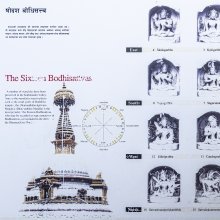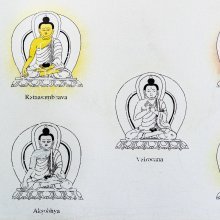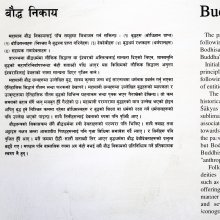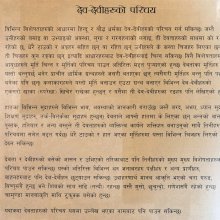Aru, Āru, Ārū, Āṟukaṭṭu: 15 definitions
Introduction:
Aru means something in Hinduism, Sanskrit, Buddhism, Pali, Jainism, Prakrit, biology, Tamil. If you want to know the exact meaning, history, etymology or English translation of this term then check out the descriptions on this page. Add your comment or reference to a book if you want to contribute to this summary article.
Aru has 14 English definitions available.
Images (photo gallery)
Languages of India and abroad
Sanskrit dictionary
[Deutsch Wörterbuch]
Source: Cologne Digital Sanskrit Dictionaries: Böhtlingk and Roth Grosses Petersburger WörterbuchAru (अरु):—1. = arus, vgl. aruṃtuda und pākāru .
--- OR ---
Aru (अरु):—2. m.
1) Sonne [Uṇādikoṣa im Śabdakalpadruma] —
2) Name einer Pflanze (raktakhadira) [Rājanirghaṇṭa im Śabdakalpadruma] — Vgl. aruṇa .
--- OR ---
Āru (आरु):—
1) m. a) Eber. — b) Krebs. — c) Name einer Baumes (Lagerstroemia regina Roxb. nach [Wilson’s Wörterbuch]) [Medinīkoṣa r. 8.] —
2) f. Wasserkrug (s. ālu) [Scholiast] zu [Amarakoṣa 2, 9, 31.]
--- OR ---
Ārū (आरू):—adj. lohfarben (piṅgala) [Die Uṇādi-Affixe 1, 85.]
Source: Cologne Digital Sanskrit Dictionaries: Sanskrit-Wörterbuch in kürzerer FassungAru (अरु):—1. = arus in aruṃtuda.
--- OR ---
Aru (अरु):—2. m. —
1) die Sonne. —
2) roth blühender Khadira.
--- OR ---
Arū (अरू):—Adv. mit kar verwunden.
--- OR ---
Āru (आरु):——
1) m. — a) Eber. — b) Krebs. — c) eine best. Pflanze. —
2) f. Wasserkrug.
--- OR ---
Ārū (आरू):—Adj. lohfarben.
Sanskrit, also spelled संस्कृतम् (saṃskṛtam), is an ancient language of India commonly seen as the grandmother of the Indo-European language family (even English!). Closely allied with Prakrit and Pali, Sanskrit is more exhaustive in both grammar and terms and has the most extensive collection of literature in the world, greatly surpassing its sister-languages Greek and Latin.
See also (Relevant definitions)
Partial matches: Ru, Kattu, A, Aru.
Starts with (+773): Ar-uyirmaruntu, Aru bharelu haritaki, Aru-kohi, Aru-maca-katankaran, Aru-maca-muttaikaran, Aru-macatantu, Aru-matakati, Aru-minkatalan, Aru-molivinayakar, Aru-mukacuvamikal, Aru-mule-kanda, Aru-muum, Aru-pani, Aru-vakaiarici, Aru-vakaicakkaravarttikal, Aru-vakaipatai, Aru-vakaitanai, Aru-vakaiuyir, Aru-vilaikalam, Arua.
Ends with (+1880): Aaru, Abaru, Abbaru, Abhrataru, Abujadodaru, Acaru, Accaru, Accibaru, Acitaru, Adaru, Adarubedaru, Adavihesaru, Addabaru, Addahesaru, Addambaru, Addamparu, Addatodaru, Additaru, Adhiyaru, Adhodaru.
Full-text (+1242): Arush, Arumtuda, Arava, Sthulakanda, Arushkara, Arumshika, Arukri, Aruhsrana, Surana, Aru-kohi, Kacvi, Arushka, Arushiya, Anarus, Kanthala, Arunuru, Vanikar-arutolil, Evvaru, Shataruka, Arupatu.
Relevant text
Search found 30 books and stories containing Aru, Āru, Ārū, A-ru, Ā-ru, Arū, Aṟu, Arukattu, Ārukaṭṭu, Āṟu, Āṟukaṭṭu, Āṟu-kaṭṭu, Aru-kattu; (plurals include: Arus, Ārus, Ārūs, rus, Arūs, Aṟus, Arukattus, Ārukaṭṭus, Āṟus, Āṟukaṭṭus, kaṭṭus, kattus). You can also click to the full overview containing English textual excerpts. Below are direct links for the most relevant articles:
Rig Veda (translation and commentary) (by H. H. Wilson)
Tiruvaymoli (Thiruvaimozhi): English translation (by S. Satyamurthi Ayyangar)
Pasuram 6.8.8 < [Section 8 - Eighth Tiruvaymoli (Pon-ulaku aliro)]
Pasuram 5.3.1 < [Section 3 - Third Tiruvaymoli (Macu aru Coti)]
Pasuram 1.3.5 < [Section 3 - Third Tiruvaymoli (Pattu utai Atiyavar)]
Chapter XXIV - The Chieftainship Of People And Animals
Chapter XIII - The Nature Of The Oceans
Vernacular architecture of Assam (by Nabajit Deka)
Review of Literature < [Chapter 1]
Moran Vernacular Architecture < [Chapter 7]
Later Chola Temples (by S. R. Balasubrahmanyam)
Temples in Tirundu-devangudi < [Chapter II - Temples of Kulottunga I’s Time]
The Religion and Philosophy of Tevaram (Thevaram) (by M. A. Dorai Rangaswamy)
Chapter 4.6 - (b) Symbology of Man (the deer) < [Volume 2 - Nampi Arurar and Mythology]
Nayanar 27: Nami Nandi Adigal (Naminanti Atikal) < [Volume 4.1.1 - A comparative study of the Shaivite saints the Thiruthondathogai]
Symbology of the skull in the Mahavrata < [Volume 2 - Nampi Arurar and Mythology]




